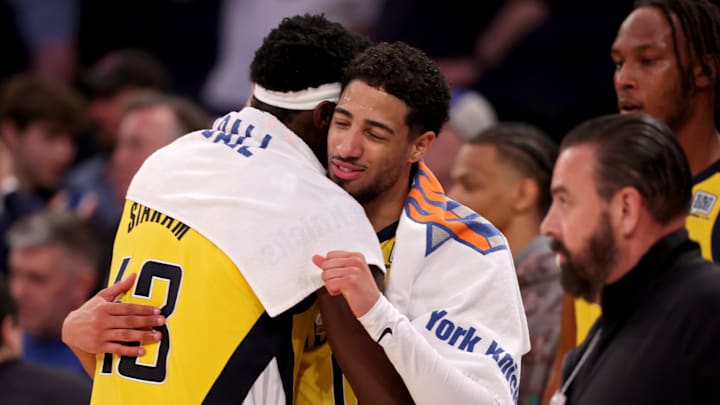Aaron Nesmith
First Round Stats: 6 Games, 35 MPG, 11 PPG, 4.2 RPG, 2.7 APG, 0.7 SPG, 1.3 BPG, 1.2 TOV, 3.8 FPG 35.1/30.8/93.3 Splits on 51.9% TS
Second Round Stats: 7 Games, 30.7 MPG, 10.1 PPG, 5.6 RPG, 2 APG, 0.4 SPG, 0.1 BPG, 1.1 TOV, 3.9 FPG 52/29.2/92.3 Splits on 63.7% TS
Conference Finals Stats: 4 Games, 33.6 MPG, 10.3 PPG, 5 RPG, 1.8 APG, 1 SPG, 2 TOV, 4 FPG 44.1/18.8/88.9 Splits on 54% TS
Overall Stats: 17 Games, 32.9 MPG, 10.5 PPG, 4.9 RPG, 2.2 APG, 0.6 SPG, 0.5 BPG, 1.4 TOV, 3.9 FPG 43.3/27.8/91.9 Splits on 56.6% TS
As a team not particularly known for their stifling defense, Aaron Nesmith was thrust into the starting lineup to provide exactly that. Arguably Indiana's best shooter from a percentage standpoint prior to the All-Star Break, Nesmith just did not have the same shooting stroke he exhibited in the first four months of the season, and it showed in the playoffs.
On certain nights, Nesmith was a solid shooter, like his 3/5 performance in Game 4 of the Milwaukee series or his 3/7 in Game 6 of that same series. Additionally Nesmith also shot a perfect 2/2 from deep in Game 7 to send New York packing.
More often than not, however, his shot simply would not fall. This is evident from Nesmith not shooting higher than 30.8% from deep in a series, with his percentage gradually decreasing from series to series, ending with a putrid 18.8% shooting clip from deep against Boston. The bottom line is that Aaron Nesmith was not a good shooter in the playoffs most of the time.
However, this doesn't matter as much as it would for others, because in Nesmith's case, his best quality is something he almost never lacks, which is his defense and hustle. It was evident in spurts during the Milwaukee series, but following that, Nesmith's defense, specifically on Jalen Brunson, played a huge part in swaying the momentum of the series in Indiana's favor.
Brunson was actively a worse shooter and overall player with Nesmith on him compared to Andrew Nembhard, and when Indiana committed to this matchup in Games 2, 3, 6, and 7, the results were heavily in their favor. Every game that Nesmith was on Brunson from start to finish resulted in an Indiana win, and it helped that he poured in 19 points in Game 7, a day where seemingly every Pacer had the hot hand.
While Nesmith is, and will always be a great defender, the Bostons series showed that he isn't a miracle worker. Tasked with guarding Jayson Tatum, his old teammate, Nesmith tried his best to fend off Tatum's scoring ability but was not too successful.
Part of this has to do with him simply not being tall and long enough to guard certain wing scorers, and part of it also has to do with his aggressiveness on the defensive end, being called for 15 fouls over the first three games of the series. Either way, it also didn't help that Nesmith's shot was at a low point for the season at this point, as his aforementioned 18.8% average was not good enough, especially when he couldn't even make the open ones.
Nesmith certainly impressed in his first playoff run with real playing time, especially on the defensive end. However, he still has a lot of work to do in terms of discipline, as the Pacers would not like him to rack up so many fouls. Additionally, they are also hoping that he gets his jumper back before the season starts, as it is clear the shin splits he suffered in February are still bothering him to this day.
